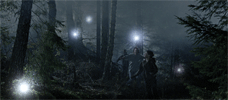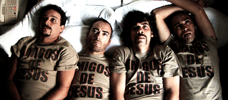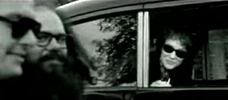Reviews
Shamim Sarif
UK / South Africa, 2007
Credits
Review by Tom Huddleston
Posted on 28 October 2007
Source Enlightenment Productions 35mm print
Categories The Times BFI 51st London Film Festival
The list of novelists who have adapted and then directed movie versions of their own work is, perhaps unsurprisingly, rather short. Bruce Robinson’s Withnail And I was based on an unpublished novel, while Stephen King infamously came a cropper with his ludicrous directorial debut (and hopefully swansong) Maximum Overdrive. But beyond that the field is, to my knowledge, bare. And maybe this is for the best—authors tend to be precious about their work, unwilling to make the harsh cuts and restructuring necessary for a successful translation from page to screen, even if all they’re asked to do is write the script. For a writer to then take the next step and realise that work, with all the compromises and setbacks inherent to any film production, must be an emotional and at times painful experience. I’ve not read Shamim Sarif’s feted debut novel The World Unseen, but its cinematic incarnation seems to have suffered in the translation.
As a window into a hitherto unexplored subculture, the film is undeniably interesting. But as a work of narrative fiction, there’s little here we haven’t seen before. In 1950’s, apartheid-ruled South Africa, two women of Indian origin begin a tenuous friendship—Miriam is a repressed housewife and mother of two, living in a remote house on the outskirts of Cape Town. Amina is a rebel, ‘masculine’ in thought, deed and dress, part-owner of a popular café, misunderstood by her traditionalist family who only want to see her married off and domesticated.
To its credit, The World Unseen manages to steer clear of some of the clichés inherent in the material. There are moments near the beginning when one starts to dread the inevitability of certain upcoming scenes—the Bend It Like Beckham mother-daughter confrontations over the nature of a woman’s place and her responsibilities to her family, or an awkward-comic arranged introduction to a potential husband. These scenes are present and accounted for, but luckily they are brief and actually rather funny, and far less important to the narrative than other, more interesting plot threads.
The central relationship is nicely played, shifting from awkwardness and tentative attraction to friendship and eventually intimacy. Neither character manages to rise far above her initial appearance - tomboy and housewife, respectively - but their gradual dance around one another is played very sweetly, and never descends into cheap sentiment.
But in other areas, the film wanders deep into formulaic territory, hampered by a predictable storyline and a crushing lack of subtlety. This is perhaps most starkly outlined in the characters of two white South African cops, whose arrival is heralded by shattering pottery and gunfire, and who make their presence felt by swearing, grabbing women by the throat and generally acting like monsters, in time-honoured bad-cop fashion. I’m sure it’s fair to say that most apartheid-era policemen were just such caricatures, but surely that’s common knowledge by now, and doesn’t need to be reiterated in such a clumsy, crass fashion.
Miriam’s husband and his inevitable extramarital affair with his scheming sister-in-law feel equally familiar, as does his transition from decent but neglectful spouse to abusive, paranoid chauvinist. A more interesting subplot - elderly black café worker Jacob’s tentative relationship with the local white postmistress - feels underdeveloped, and although we like both of these characters we are never given a chance to get to know them.
Perhaps the main problem here, ironically, is the dialogue, which is essentially declarative and functional, lacking any sense of real poetry. Better actors could, perhaps, have made something of it, but the central cast are uniformly awkward, particularly the two leads. A few sideline characters make a stronger impression—David Dennis, as the aforementioned Jacob, is subtly affecting, his cracked face showing all the strain of a lifetime of oppression and self denial. But the only actor here who genuinely seems to be enjoying himself is Bernard White as Amina’s father, an underused and very likeable character actor (familiar from, among other things, those awful Matrix sequels) who makes the most of an underwritten part.
Visually, the film is surprisingly subtle and rather beautiful—the South African landscape has always translated well onto film, and this is no exception. For her interiors and costumes Sarif employs a well chosen colour palette, all rich browns and soft, natural shades, complementing both the surrounding landscape and the skin tones of her actors—the white cops in their blue uniforms look even more garishly out of place. The use of makeup is less understated, and sometimes faintly comical—even after digging a garden for several hours, even during childbirth, these women never look anything less than perfect, their lipstick unsmudged, their hair immaculate.
There are some films which one feels churlish for criticising too harshly—The World Unseen is clearly a labour of great love for all concerned, particularly the author-director. But Sarif makes the terrible mistake of failing to trust her audience, and feeling she needs to signpost every development, every plot turn, every emotional peak. Supposedly meaningful glances between characters are preposterously oversustained. The ‘good’ characters never set a foot wrong, while the ‘bad’ are, for the most part, irredeemable. The score is unbearably syrupy, drowning us in heavy, glutinous strings. All of which is a shame, because there’s a touching, likeable human story buried under here, struggling heroically to get out.
More The Times BFI 51st London Film Festival
-

Island of Lost Souls
2007 -

Garage
2007 -

Exodus
2007 -

Friends of Jesus
2007 -

We Want Roses Too
2007 -

The Trap
2006 -

Captain Ahab
2007 -

Shotgun Stories
2007 -

Savage Grace
2007 -

The Assassination of Jesse James by the Coward Robert Ford
2007 -

The World Unseen
2007 -

Things We Lost In The Fire
2007 -

Lions for Lambs
2007 -

Talk to Me
2007 -

Redacted
2007 -

Battle For Haditha
2007 -

Chaotic Ana
2007 -

Angel
2007 -

Juno
2007 -

Fay Grim
2006 -

Reservation Road
2007 -

I’m Not There
2007
We don’t do comments anymore, but you may contact us here or find us on Twitter or Facebook.



